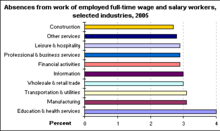| The examples and perspective in this article deal primarily with the United States and do not represent a worldwide view of the subject. You may improve this article, discuss the issue on the talk page, or create a new article, as appropriate. (May 2009) (Learn how and when to remove this message) |
In economics, the absence rate is the ratio of workers with absences to total full-time wage and salary employment. In the United States, absences are defined as instances when persons who usually work 35 or more hours per week worked less than 35 hours during the reference week for one of the following reasons: own illness, injury, or medical problems; childcare problems; other family or personal obligations; civic or military duty; and maternity or paternity leave.
Statistics


In 2005, workers in the education and health services sector had the highest absence rate in the private sector at 4.0 percent, while workers in natural resources, construction, and maintenance occupations and in management, professional, and related occupations had the lowest absence rates.
See also
References
- "BLS Information". Glossary. U.S. Bureau of Labor Statistics Division of Information Services. February 28, 2008. Archived from the original on 6 May 2009. Retrieved 2009-05-05.
- "Absence rates and industry, 2005". TED: The Editor's Desk. U.S. Bureau of Labor Statistics Division of Information Services. February 14, 2006. Archived from the original on 7 May 2009. Retrieved 2009-05-05.
- "Absence rates and occupation, 2005". TED: The Editor's Desk. U.S. Bureau of Labor Statistics Division of Information Services. January 31, 2006. Archived from the original on 7 May 2009. Retrieved 2009-05-05.
- "Absences from work of employed full-time wage and salary workers by occupation and industry" (PDF). 2005 annual tables, household data, Employment and Earnings. Bureau of Labor Statistics, Current Population Survey (CPS). pp. 273–274. Archived from the original (PDF) on 29 September 2024. Retrieved 2009-05-05.
External links
This article related to macroeconomics is a stub. You can help Misplaced Pages by expanding it. |